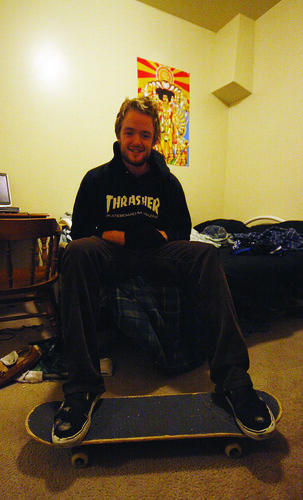Ian MacKaye, vocalist for the band Minor Threat, coined the term “straight-edge,” but what exactly does it mean? Everyone seems to hold various ideas and stereotypes about what it is to be straight-edge, and though “edge” students sometimes differ in their beliefs, the same underlying themes exist.
“Straight-edge is a rebellion that was started through hardcore,” said Sean Balaban, a sophomore BTMM major. “It’s not just against getting drunk or doing drugs, it’s against having a glass of wine with dinner or a casual drink with friends.”

Balaban claimed “edge” in the beginning of high school.
“I was never into the idea of drinking or drugs or any of that stuff,” he said. “I didn’t want to have my life revolve around all of that like everyone else’s does. I didn’t and still don’t need anything like that to identify myself with.”
Joe Fasano agrees.
“I went to parties and stuff, but I never drank,” the freshman secondary science education major said. “I’ve never drank in my life. I have a problem when people depend on drinking and drugs to have fun. I think that’s ridiculous.”
There are also students who choose to abstain from drugs and alcohol but do not label themselves as “straight-edge.”
Sophomore history major John Mullen used to consider himself part of the straight-edge community. He still lives the same lifestyle but decided to denounce the straight-edge label.
“I made a personal choice for myself,” he said.
Mullen said his decision is based on personal reasons rather than the shared reasons of a community. Though he doesn’t consider himself straight-edge anymore, he appreciates the “camaraderie factor” and the values of the scene.
“It’s awesome, and you keep your body clean,” he said.
Despite a common misconception, most straight-edge students do not dislike other students who do not live their lives the way they do.
“My friends respect the lifestyle I chose to live, and I respect the lifestyle they want to live,” Balaban said. “Being straight-edge has nothing to do with them or getting other people to believe in my ways. That’s not what it’s about. It’s for you and you only if you choose so.”
Fasano has friends who are straight-edge and friends who aren’t. One of his best friends is also edge.
“There’s strength in numbers,” Fasano said.
For people like Mullen, the straight-edge label may be a phase, but they continue to live the same lifestyle. Others decide to “break edge” completely, something many straight-edge students frown upon.
“The way I see it, ‘breaking edge’ involves doing anything that alters the way your mind and body react to the rest of the world,” said Balaban, who plans on staying straight-edge for the rest of his life. “There’s a dumb saying that people say when someone breaks edge – ‘If you’re not now, you never were.’ Which is kind of half true.”
Though breaking edge is looked down upon by those who label themselves as straight-edge, it is completely acceptable to claim edge even after experimenting with drugs and alcohol.
“As long as you’re in it for the right reasons, and [there’s] no going back,” Balaban said.
Fasano shares the same opinion about living a straight-edge lifestyle.
“I absolutely hate when people attempt straight-edge and don’t commit,” he said. “I’m straight edge now, and I will be forever. I have it tattooed on my leg. It’s there for life.”
Natasha Shapiro can be reached at natasha.shapiro0001@temple.edu.


Be the first to comment